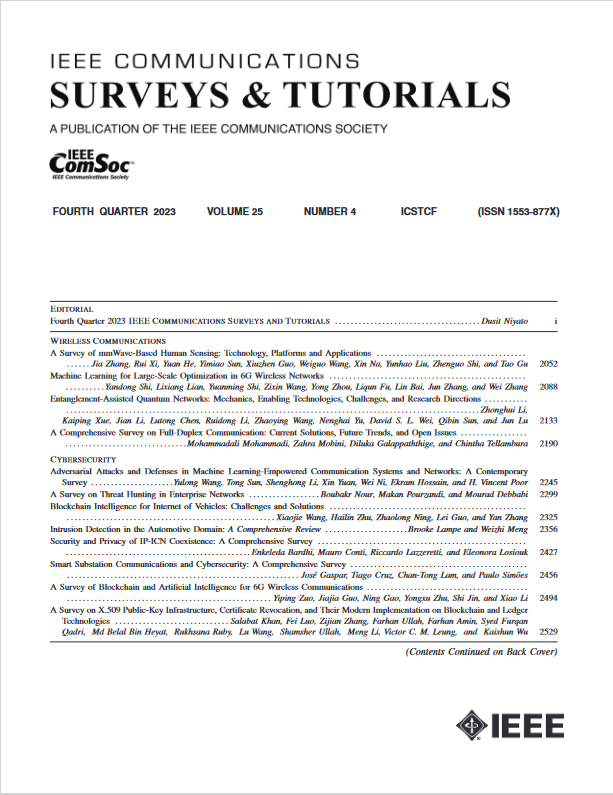Toward Autonomous Multi-UAV Wireless Network: A Survey of Reinforcement Learning-Based Approaches
IF 34.4
1区 计算机科学
Q1 COMPUTER SCIENCE, INFORMATION SYSTEMS
引用次数: 1
Abstract
Unmanned aerial vehicle (UAV)-based wireless networks have received increasing research interest in recent years and are gradually being utilized in various aspects of our society. The growing complexity of UAV applications such as disaster management, plant protection, and environment monitoring, has resulted in escalating and stringent requirements for UAV networks that a single UAV cannot fulfill. To address this, multi-UAV wireless networks (MUWNs) have emerged, offering enhanced resource-carrying capacity and enabling collaborative mission completion by multiple UAVs. However, the effective operation of MUWNs necessitates a higher level of autonomy and intelligence, particularly in decision-making and multi-objective optimization under diverse environmental conditions. Reinforcement Learning (RL), an intelligent and goal-oriented decision-making approach, has emerged as a promising solution for addressing the intricate tasks associated with MUWNs. As one may notice, the literature still lacks a comprehensive survey of recent advancements in RL-based MUWNs. Thus, this paper aims to bridge this gap by providing a comprehensive review of RL-based approaches in the context of autonomous MUWNs. We present an informative overview of RL and demonstrate its application within the framework of MUWNs. Specifically, we summarize various applications of RL in MUWNs, including data access, sensing and collection, resource allocation for wireless connectivity, UAV-assisted mobile edge computing, localization, trajectory planning, and network security. Furthermore, we identify and discuss several open challenges based on the insights gained from our review.面向自主多无人机无线网络:基于强化学习的方法综述
基于无人机(UAV)的无线网络近年来受到越来越多的研究兴趣,并逐渐应用于社会的各个方面。无人机应用的日益复杂,如灾害管理、植物保护和环境监测,导致对无人机网络的要求不断升级和严格,单个无人机无法满足。为了解决这个问题,多无人机无线网络(MUWNs)已经出现,提供增强的资源承载能力,并使多无人机能够协同完成任务。然而,多目标网络的有效运行需要更高的自主性和智能水平,特别是在不同环境条件下的决策和多目标优化方面。强化学习(RL)是一种智能的、目标导向的决策方法,已经成为解决与MUWNs相关的复杂任务的一种有前途的解决方案。正如人们可能注意到的那样,文献仍然缺乏对基于rl的MUWNs的最新进展的全面调查。因此,本文旨在通过对自主MUWNs背景下基于强化学习的方法进行全面回顾来弥合这一差距。我们介绍了RL的信息概述,并展示了它在MUWNs框架内的应用。具体来说,我们总结了RL在MUWNs中的各种应用,包括数据访问、传感和收集、无线连接的资源分配、无人机辅助的移动边缘计算、定位、轨迹规划和网络安全。此外,我们根据从回顾中获得的见解,确定并讨论了几个开放的挑战。
本文章由计算机程序翻译,如有差异,请以英文原文为准。
求助全文
约1分钟内获得全文
求助全文
来源期刊

IEEE Communications Surveys and Tutorials
COMPUTER SCIENCE, INFORMATION SYSTEMS-TELECOMMUNICATIONS
CiteScore
80.20
自引率
2.50%
发文量
84
审稿时长
6 months
期刊介绍:
IEEE Communications Surveys & Tutorials is an online journal published by the IEEE Communications Society for tutorials and surveys covering all aspects of the communications field. Telecommunications technology is progressing at a rapid pace, and the IEEE Communications Society is committed to providing researchers and other professionals the information and tools to stay abreast. IEEE Communications Surveys and Tutorials focuses on integrating and adding understanding to the existing literature on communications, putting results in context. Whether searching for in-depth information about a familiar area or an introduction into a new area, IEEE Communications Surveys & Tutorials aims to be the premier source of peer-reviewed, comprehensive tutorials and surveys, and pointers to further sources. IEEE Communications Surveys & Tutorials publishes only articles exclusively written for IEEE Communications Surveys & Tutorials and go through a rigorous review process before their publication in the quarterly issues.
A tutorial article in the IEEE Communications Surveys & Tutorials should be designed to help the reader to become familiar with and learn something specific about a chosen topic. In contrast, the term survey, as applied here, is defined to mean a survey of the literature. A survey article in IEEE Communications Surveys & Tutorials should provide a comprehensive review of developments in a selected area, covering its development from its inception to its current state and beyond, and illustrating its development through liberal citations from the literature. Both tutorials and surveys should be tutorial in nature and should be written in a style comprehensible to readers outside the specialty of the article.
 求助内容:
求助内容: 应助结果提醒方式:
应助结果提醒方式:


